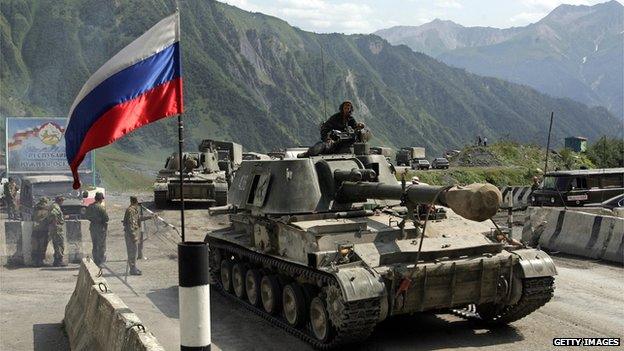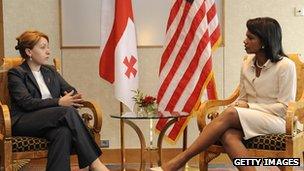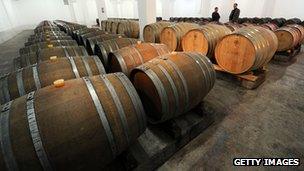Five years on, Georgia makes up with Russia
- Published

Russian tanks poured into Georgia during the 2008 conflict, part of the force that dealt a devastating blow to Georgia's ambition to re-establish control over breakaway territory
Five years after losing a war with Russia, Georgia now wants to make friends with the Kremlin. But Georgia is also keen to integrate fully with the West. Can it do both, asks the BBC's Georgia correspondent Damien McGuinness.
When Russian forces swept through the Georgian village of Ergneti, the house of 74-year-old Ivane Dvalishvili was burned down, his livestock stolen and irrigation systems destroyed.
Half a decade later, his home and his life are still in ruins, a visible scar of Georgia's war with Russia.
"We used to grow peaches and fruit here," he said. "But since the war we've not been able to grow anything."
On 8 August, Georgia will mark the fifth anniversary of the outbreak of the war. It lasted only five days but it was disastrous for Georgia.
The war began with an operation by Georgia, which hoped to seize territory that had been outside its control since the early 1990s.
Initially successful, it did not take Russia's army long to retake the area and push deeper into Georgian territory, stopping just short of the capital, Tbilisi.
Nearly 1,000 people were killed while tens of thousands of Georgians living in the disputed areas were forced out of their homes.
Russian troops are now stationed in 20% of the country's territory.
Moscow and Tbilisi promptly broke off diplomatic relations with each other while the Russian and Georgian leaders indulged in undiplomatic insults.
Vladimir Putin has famously said he wanted to hang up Georgia's President Mikheil Saakashvili by the genitals.
The tall Mr Saakashvili reportedly jokes about Mr Putin's diminutive stature, calling him "Lilli-Putin".
Ordinary Georgians continued to suffer however. Travel to Russia, even to visit relatives or work, became difficult while Georgian companies found themselves cut out of their most important market.
But now Georgia's new government, which ousted President Saakashvili's party from power in October, wants to re-establish trade and business links with Moscow.
Political overtures from Tbilisi have already persuaded Moscow to scrap its ban on sales of Georgian wine and mineral waters in Russia.
There are also signs that visa restrictions for Georgians travelling to Russia could be eased. And on 11 June, President Putin said that he supports restoring "full-scale relations".
Despite the scars left behind by the war, it is a policy which has broad support among Georgian voters.
"We love Russia," a Georgian friend Maka once told me, when I asked if there were any hard feelings about the war. "We just don't like Putin very much."
Georgia has had close links to Russia for centuries.
Georgians admire Russian literature and culture. They have traditionally viewed Christian Russia as the route to Europe as well as a bulwark against encroaching Muslim empires to the South, in modern day Iran and Turkey.
During the 70 years as part of the Soviet Union, sunny Georgia had the sort of reputation that Italy has in northern Europe: charmingly chaotic, with great food, wine and weather.
So the break between the two countries was traumatic, at least for Georgia.
Ask any Georgian where they were on the day their tiny country suddenly found itself at war with its huge and powerful neighbour, and they will be able to tell you.
It was a terrifying moment for an impoverished former Soviet republic of fewer than five million people.

A show of solidarity in 2008 for Georgia's foreign minister from then US Secretary of State Condoleezza Rice
It was an equally terrifying prospect for the West.
The US-backed 2003 Rose Revolution led by Mr Saakashvili had transformed Georgia from a corrupt, Soviet-style, failed state into a democratic Western project near the heart of the former Soviet Union.
In the process, the country also become a key Nato ally, so there were real worries that Georgia would now drag Europe and the US into full-scale war with Russia.
The fighting broke out over the small mountainous landlocked territory of South Ossetia, a region backed by Russia, that broke away in the early 1990s.
In Tbilisi however, and for most of the international community, it is viewed as Georgian territory.
An independent EU report accused Russia of ethnic cleansing in the area and violating international law. But it also blamed Mr Saakashvili's government for firing the first shots.
President Saakashvili is adamant that Georgia acted in self-defence, pointing to the large build-up of Russian troops on the other side of the border earlier that summer.
Now that President Saakshvili's party is no longer in power, a bitter row is growing in Tbilisi about the conduct of the war. In part, it is fuelled by political rivalry.
In May, Mr Saakashvili's rival, the billionaire tycoon Bidzina Ivanishvili, who is now Georgia's prime minister, launched a fresh inquiry into the war.
The president has dismissed such criticisms as unpatriotic and playing into the hands of Russian propaganda, an accusation that fits the portrayal of Mr Ivanishvili as a Russian stooge.
The billionaire tycoon made his wealth in 1990s Moscow, making him suspect in some eyes. When he burst onto the political scene last year and announced his intention to run for prime minister, many accused him of being intent on destabilising Georgia.

Could exports of Georgian wine to Russia lead to better relations between the two countries?
In contrast to the US-educated president, the prime minister speaks fluent Russian but little English.
Following his triumph in October's election, many international commentators made much of their belief that Georgia was going the way of Ukraine and slipping back into Russia's orbit.
But since coming to power Mr Ivanishvili has been clear that Georgia's main foreign policy objective remains Nato and EU membership.
After years of dangerous tensions with the Kremlin, his calmly pragmatic and level-headed approach to Russia is popular with Georgian voters.
Winegrowers are looking forward to getting back into the huge Russian market; and the tourist sector expects a boom in Russian visitors this summer.
According to a recent poll 68% of Georgians trust the new government's approach to Russia.
But agreement between the two neighbours over the breakaway territories, South Ossetia and Abkhazia, remains impossible. Tbilisi is adamant the regions belong to Georgia. Moscow says its recognition of their independence is non-negotiable.
Both sides have, for now at least, agreed to disagree. Instead they will focus on areas of trade and business, where reconciliation is possible and indeed mutually beneficial.
But will a rapprochement with Russia jeopardise Georgia's chances of getting into Nato?
Prime Minister Ivanishvili says he wants to see concrete movement towards membership next year. Joining Nato is seen as a guarantee against another Russian invasion.
In some Western eyes, Georgia was something of a liability under President Saakashvili, who was seen as hot-headed.
To many Western leaders the 2008 war was definitive proof of the dangers of having an unpredictable Georgia within a military alliance, especially one such as Nato with a mutual defence pact.
So being able to get on with, rather than fight, Moscow might actually help Georgia's chances of one day getting into Nato.
And when it comes to choosing between the West and Russia, there is a growing feeling in Georgia that it is no longer a simplistic question of either/or - but instead somehow managing to do both.